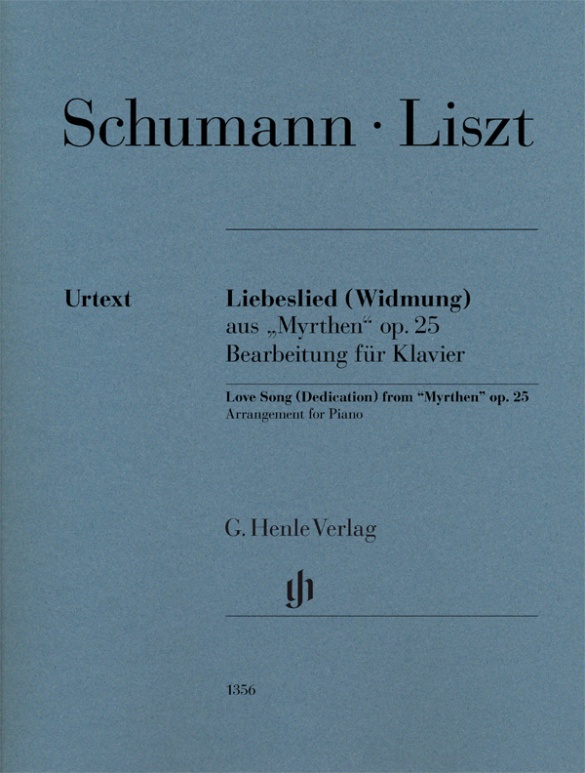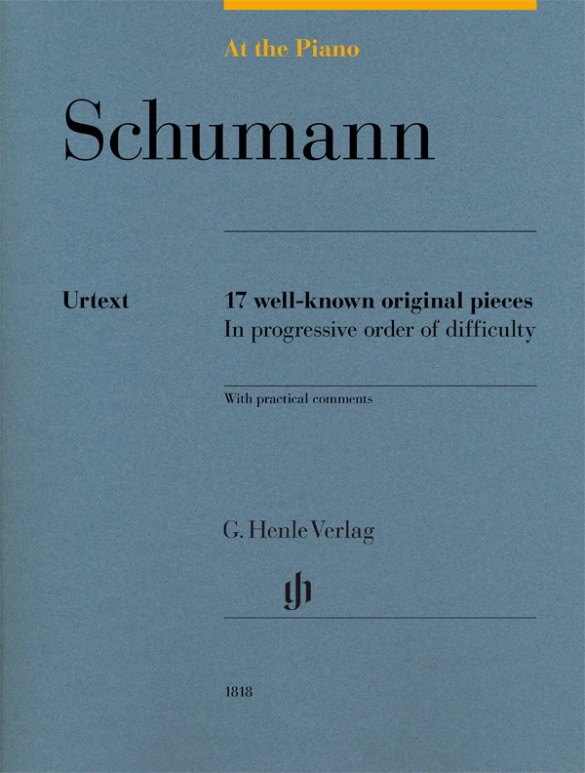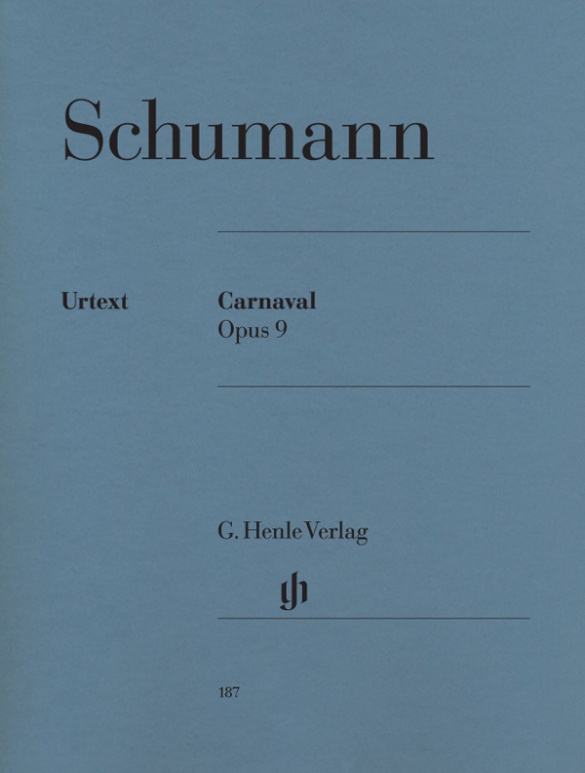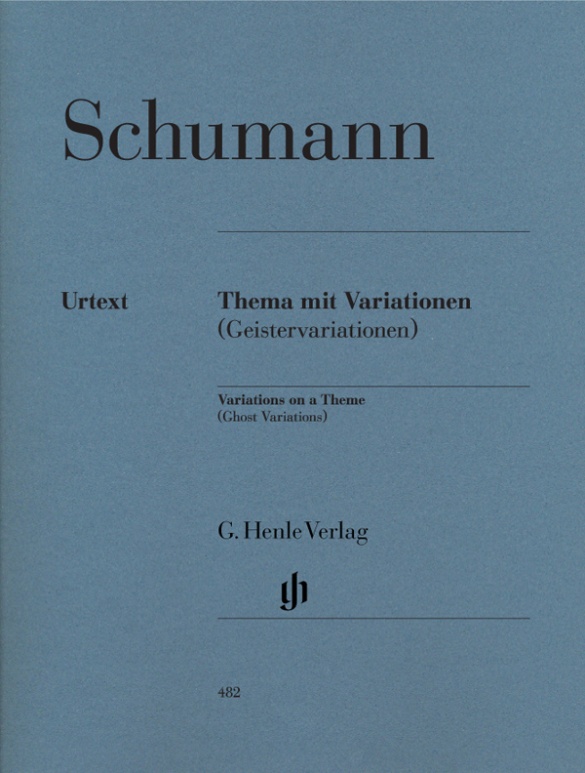

Robert Schumann
Variations sur un thème (Geistervariationen)
Les Variations sur un thème en Mi bémol majeur de Robert Schumann virent le jour en février 1854, quelques semaines avant l’admission du compositeur dans la clinique d’Endenich. En raison des événements humainement extrêmement poignants de ces journées, Clara Schumann conserva les manuscrits de ces Variations – appelées plus tard « Variations des esprits » – que son mari lui avait dédiées, dernières compositions pour piano qu’elle conserva en quelque sorte comme des reliques et dont elle interdit toute publication. La première édition qui ne parut qu’en 1939 ne correspond pas, à bien des égards, à ce que Schumann avait écrit. L’édition Henle-Urtext repose pour la première fois sur l’ensemble des sources premières accessibles et établit de ce fait la seule édition Urtext sûre de cette œuvre de plus en plus souvent donnée au cours de ces dernières années.
CONTENU/DÉTAILS
(Explanation)
CONCERNANT LE COMPOSITEUR
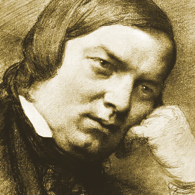
Robert Schumann
Son œuvre est marquée par le concept de la musique poétique qu’il a lui-même forgé et qui tend à une fusion de la littérature et de la musique. Ses pièces lyriques pour piano composées jusqu’en 1839 en sont tout particulièrement exemplaires. Il s’est ensuite consacré à d’autres genres (lied, symphonie et musique de chambre entre autres).
| 1810 | Né à Zwickau le 8 juin, fils d’un libraire. |
| à partir de 1828 | Études de droit à Leipzig, cours de piano auprès de Friedrich Wieck. Se décide pour une carrière de musicien. |
| 1830–39 | Compose exclusivement des œuvres pour piano, surtout des cycles, entre autres: «Papillons» op. 2 (1829-32), «Carnaval» op. 9 (1834/35), «Davidsbündlertänze» op. 6 (1837), «Scènes d’enfants» op. 15 (1837/38), «Kreisleriania» op. 16 (1838), «Novelettes» op. 21 (1838). |
| 1832 | Une paralysie partielle de la main droite rend impossible une carrière de pianiste. 1833 Fondation de la confrérie imaginaire du «Davidsbund». |
| 1835–44 | Dirige la Neue Zeitschrift für Musik (Nouveau Journal pour la Musique). |
| 1840 | Mariage avec Clara Wieck; 138 lieder parmi lesquels le Liederkreis op. 39 sur des poèmes d’Eichendorff, le cycle de lieder «Dichterliebe» op. 48. |
| 1841 | 1re Symphonie en Si bémol majeur («Symphonie du Printemps») op. 38 et 4e Symphonie en Ré mineur op. 120. |
| 1842 | 3e Quatuor à cordes op. 41; autres œuvres de musique de chambre. |
| 1843 | Professeur de composition au conservatoire de Leipzig. Oratorio «Le Paradis et la Péri» op. 50. |
| 1845 | Il s’installe à Dresde. Voyage en Russie. |
| 1845 | Concerto pour piano en La Mineur op. 54, 2e Symphonie en Ut majeur op. 61. |
| 1850 | Directeur général de la musique à Düsseldorf. Création à Leipzig de l’opéra «Genoveva» op. 81. Symphonie en Mi bémol majeur («Rhénane») op. 97; concerto pour violoncelle en La mineur op. 129. |
| 1854 | Naissance d’une amitié avec Brahms. Achèvement des Scènes de Faust. Concerto pour violon en Ré mineur pour Joseph Joachim. |
| 1854 | Tentative de suicide et hospitalisation à la clinique psychiatrique d’Endenich. |
| 1856 | Meurt le 29 juillet à Endenich près de Bonn. |
About the Authors

Wolf-Dieter Seiffert (Editeur)
Dr. Wolf-Dieter Seiffert, born in 1959 in Frankfurt/M., read musicology, modern German literature, and philosophy at the Ludwig-Maximilians-Universität in Munich. On a scholarship from the “Studienstiftung des Deutschen Volkes”, he did his doctorate in 1990 with a thesis on “Mozarts frühe Streichquartette” (Rudolf Bockholdt). That same year, Seiffert started work at G. Henle Publishers as an editor. Parallel to his work at the publisher, he completed a diploma in business studies at the St. Gallen University, KMU-HSG, financed by the Günter Henle Foundation. Seiffert was managing director of G. Henle Verlag from 2000 to 2023.
Seiffert has edited numerous Urtext editions for G. Henle Publishers, predominantly on Mozart’s works.

Klaus Schilde (Doigtés)
Prof. Klaus Schilde, born in 1926, spent his childhood in Dresden. There he was greatly influenced by Walter Engel, who taught him the piano (Kodaly method), composition and violin. From 1946–1948 he studied at the music conservatory in Leipzig with Hugo Steurer. After moving to the west in 1952 he studied with Walter Gieseking and Edwin Fischer, as well as with Marguerite Long, Lucette Descaves and Nadia Boulanger in Paris.
Schilde won numerous prizes. From 1947 onwards he gave concerts as a soloist and chamber musician on almost every single continent with renowned orchestras. He taught at the music conservatories in East Berlin Detmold, West Berlin, Munich, Tokyo (Geidai) and Weimar. From 1988–1991 he was President of the Staatliche Hochschule für Musik und Theater in Munich, where he also taught for decades as a professor. There are numerous radio and television broadcasts with Klaus Schilde as well as CD recordings. Schilde has contributed fingerings to almost 100 Henle Urtext editions.
Prof. Klaus Schilde passed away on 10 December, 2020.
Informations sur la sécurité du produit

G. Henle Verlag
Vous trouverez ici des informations sur le fabricant du produit.G. Henle Verlag e.K.
Forstenrieder Allee 122
81476 München
Allemagne
info@henle.de
www.henle.com
Inhalt: außergewöhnlich (5 Sterne)Druck: außergewöhnlich (5 Sterne)Layout: außergewöhnlich (5 Sterne)
Music ManualIn typical fashion, G. Henle Verlag, has published this work that demonstrate and reinforce that this publisher is the yardstick/benchmark for other publishers of classical repertoire. Apart from being Urtext editions, I have not seen better notational type-setting in terms of the clear arrangement of bars on the page, the width of the staves, the sizes of the notes and the quality of the off-white parchment which is always a pleasure to read from -- visual accessibility and integrity are never compromised. Apart from the type-setting; I personally find that the G. Henle Verlag editions are excellent in terms of convenient fingerings that are logically and clearly set out -- again it is a joy not to be overly cluttered with editorial markings. Essential publications for the shelves of any serious performer.
Australian Music Teacherrecommandations
autogenerated_cross_selling
Autres éditions de ce titre
Autres éditions de ce titre


